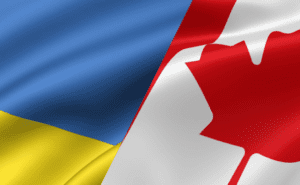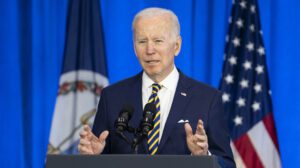
President of Ukraine Volodymyr Zelensky has said that the government should speed up the transportation of fuel from European ports to Ukrainian consumers.
“The key task for government members is to speed up the transportation of fuel from European ports to our consumers. The volume of such transportation should increase daily,” Zelensky said in a traditional video message on Saturday.
He said that at present, everything is being done to ensure that the state fulfills all social obligations, despite the budget deficit due to the destruction of the Ukrainian economy by the Russian army.
At a meeting with members of the government on Saturday, Zelensky recalled that the issue of fuel shortage was raised last week. “At the beginning of last week, we agreed that we would resolve the issue this week. The week is ending,” Zelensky said.
In turn, First Deputy Prime Minister, Minister of Economy Yulia Svyrydenko called the main problem – the logistics of receiving fuel for Ukraine in Eastern European ports.
“If you look at imports, over the past five days we have been importing exactly the same amount, even a little more, than we consume. Europe was simply not ready: not even in terms of resources, but in terms of logistics. We have a bottleneck – these are ports, European ports,” she said.
“We have Gdansk, Gdynia, Swinoujscie, Constanta, Burgas – there is a traffic jam. We asked [Foreign Minister] Dmytro Kuleba to get involved already at the international level – to ask for a green corridor for Ukraine in these ports,” Svyrydenko added.

Ukrainian athletes won thirteen medals on the seventh day of the Deaflympic Games in Caxias do Sul (Brazil), the Ministry of Youth and Sports reported.
According to the press service of the ministry, at the XXIV Summer Deaflympics, the national deaflympics team of Ukraine won 13 awards on the seventh day – 8 gold, 1 silver and 4 bronze.
In particular, the gold medals for Ukraine were won by: Elisaveta Topchanyuk (cycling, criterium), Nazar Levitsky, Anna Fedoseyeva (orienteering, mixed relay), Oleksiy Lazebnik, Inna Afonchenko (ball shooting, 10 m air pistol, mixed), Natalka Ursulenko ( shot put), Maxim Ovcharenko, Roksolana Budnik (table tennis, mixed team), Irina Tereshchenko (swimming, 100 m breaststroke), Dmitry Rudenko, Sergey Drach, Solomiya Kuprich, Kristina Kinyaikina (athletics, mixed relay 4×40) and swimmers Artem Karnysh , Ivan Zinenko, Maxim Dudnik, Vladislav Adamovich in the 4x200m free style relay.
Athlete Yekaterina Potapenko won silver in the heptathlon.
Bronze was won by Nikolay Nosenko (athletics, 100m), Vladislav Kremlyakov (swimming, 50m backstroke), Maria Levanovich (taekwondo, up to 67 kg) and Gennady Zakladnoy and Yulia Khodko in table tennis among mixed teams.
In general, the national Deaflympic team of Ukraine won 77 medals: 39 gold, 16 silver and 22 bronze, and continues to occupy a leading position at the Summer Deaflympiad.

Ukraine and Canada will return to work on expanding the Free Trade Agreement (FTA) and complete work on it in the coming weeks, the Ministry of Economy announced following an online meeting between First Deputy Prime Minister of Economy Yulia Svyrydenko and Minister of International Trade, Export Promotion and Small Business Canada Mary Ng.
“During the negotiations, government representatives decided to return to work on expanding the FTA Agreement between Ukraine and Canada and complete developments over the coming weeks,” the ministry said on its website on Sunday.
According to Svyrydenko, Ukraine is counting on Canada’s support in overcoming the food crisis provoked by the blocking of Ukrainian exports through seaports.
She said that an important step towards Ukraine could be the abolition of trade duties on Ukrainian goods by Canada following the EU and the UK.
“This will help exporters increase the volume of exports of products and thereby strengthen the Ukrainian economy and the defense of our state,” Svyrydenko was quoted as saying in the press release of the ministry.

US President Joseph Biden announced another security assistance package that will provide Ukraine with additional artillery ammunition, radars and other equipment.
“Today, the United States continues to provide strong support to the courageous people of Ukraine defending their country. I am announcing another security assistance package that will provide Ukraine with additional artillery ammunition, radar and other equipment,” he tweeted on Friday evening.
The White House website also indicates that there are almost no funds left to send aid to Ukraine and prompt approval of funding by Congress is required.
“With today’s announcement, my administration has nearly exhausted the funding that can be used to send security assistance to Ukraine through a reduction authority. For Ukraine to succeed in this next phase of the war, its international partners, including the US, must continue to demonstrate our unity and our determination to ensure a continuous flow of weapons and ammunition to Ukraine. Congress must quickly provide the requested funding to strengthen Ukraine on the battlefield and at the negotiating table.

As of May 1, 2022, according to preliminary data, Ukraine’s international reserves amounted to $26 billion 944.9 million (in equivalent), which is 4% less than at the beginning of April ($28.107 billion), according to the data National Bank of Ukraine, released on Friday.
“As of May 1, 2022, Ukraine’s international reserves, according to preliminary data, amounted to $26.945 billion. According to the results of April, they decreased by 4%, taking into account sales by the National Bank, which was partially offset by foreign exchange earnings in favor of the government,” the regulator explained.
He noted that the dynamics of reserves in April was affected by public debt management operations: the total volume of payments for servicing and repaying state and state-guaranteed debt in foreign currency amounted to $614 million in equivalent.
It is specified that $420 million of them were directed to servicing and redemption of domestic government bonds denominated in foreign currency, $78 million – to redeem Eurobonds.
At the same time, in April, foreign exchange receipts in favor of the government amounted to $1 billion 887 million in equivalent, including EUR629 million and $93 million received from the World Bank, EUR300 million from the French government, $236 million from the Government of Canada and EUR120 from the EU.
In addition, the NBU and the government of Ukraine paid $84 million in favor of the IMF in April.
The NBU operations on the interbank market also affected the dynamics of reserves. In April, the regulator sold $2.244 billion in the foreign exchange market and bought $43 million. In general, by the end of April, the volume of net sales of foreign currency by the National Bank in the interbank foreign exchange market amounted to $2.2 billion.
In addition, the dynamics of the indicator was affected by the revaluation of financial instruments (changes in market value and the exchange rate of the hryvnia against foreign currencies): last month their value decreased by $150.3 million in equivalent, according to NBU data.
The regulator also clarified that the net international reserves (NIR) of Ukraine in April decreased by $791 million, or 4.5%, to $16.779 billion.
As reported, at the beginning of 2022, Ukraine’s international reserves amounted to $30.941 billion, NIR – $20.767 billion.

The Ministry of Infrastructure of Ukraine and the Ministry of Infrastructure and Development of Poland have agreed to cancel permits for all carriers engaged in international transportation of fuel, the press service of the Ministry of Infrastructure reported on Friday.
“Russian missile strikes on refineries and oil depots have created a critical situation in the fuel market. The goal of the team of the Ministry of Infrastructure in these conditions is the complete liberalization of international freight traffic to solve this problem. The new rules have already entered into force, and both Ukrainian and and Polish carriers. I am grateful to the Polish side for the constructive work,” Minister of Infrastructure Alexander Kubrakov is quoted as saying.
According to him, work will continue on simplifying cargo transportation and creating the most simple and understandable rules for carriers of goods necessary for Ukraine.
To enter the territory of Poland without a permit, fuel carriers must register by filling out the form: https://forms.gle/waid3FnRX1duve9z8
You must fill out the form no later than one day before crossing the border.
As reported, in April, Ukraine and Poland also agreed to increase the volume of rail transportation of Ukrainian exports to the EU and to world markets through Europe. In particular, the parties will set up a joint logistics venture in the near future.